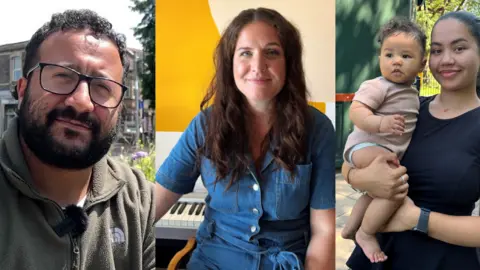The rising cost of living has sparked a significant shift in societal perspectives on parenthood, particularly highlighted by the dropping birth rates in urban areas such as Bristol, England. Observing recent statistics, it becomes evident that Bristol is experiencing the most pronounced decline in birth rates among cities in England and Wales. Over the past decade, the city has witnessed a staggering 36% drop in its birth rate, mirroring a broader national trend that has recorded a 21% decrease in fertility rates across the country.
As highlighted by the Office for National Statistics (ONS), various social and economic factors are contributing to this decline. The current economic climate, coupled with increasing financial pressures, has prompted individuals and couples to reassess their readiness for parenthood. For instance, Courtney Young, a 32-year-old Bristol resident, shared his concern regarding the burdensome economic environment when considering starting a family. “It’s always been a goal of mine to have kids in the future,” Young expressed, emphasizing the aspiration to provide for children’s needs and experiences. However, he admitted that the predominant anxiety lies in financial constraints and the uncertainty of being able to offer the quality of life he desires for his future children.
Despite Bristol’s economy doubling in size since 2004, the dwindling number of births thus raises questions about the underlying causes. The ONS reports that the overall fertility rate in the UK is currently at 1.44, which is even lower in Bristol at 1.14. This discrepancy is strikingly evident, raising concerns about future generations and the means by which potential parents can navigate these economic challenges.
Aaliyah Thomas, a 30-year-old mother of two, echoed Young’s sentiments. She indicated that she sympathizes with those who face the decision of parenthood amidst rising living costs. Thomas asserts that financial balance has become a significant challenge for families. Many in her circle have opted to delay having children until they perceive their financial situations as stable enough to support a family adequately.
Adding to this narrative, Kate, a mother of adult children, elaborated on housing costs as a substantial barrier preventing younger generations from becoming independent. She lamented that many young people are unable to afford rent, let alone save for a mortgage deposit, which is a prerequisite for homeownership. The increasing financial strain from high rental prices directly correlates to postponed family planning, as manageable living conditions are essential for nurturing children.
Kerry Gadson, a leading demographic analyst at ONS, emphasized that the motivations behind parental choices are incredibly personal and multifaceted. Notably, societal transformations since the 1960s—such as increased access to contraception, higher education for women, and greater participation in the workforce—have dramatically altered family planning norms. As a result, more individuals are leaning towards having children later in life, with the average age of new mothers now at 31.
Moreover, Bristol’s youthful demographics, characterized by a median age of 33— older than that of the broader UK average of 41— plays a role in shaping the decision-making processes around family formation. The tension between youthful aspirations and economic realities reflects the struggles faced by many when contemplating health, employment, and financial stability.
Interestingly, some individuals choose to embrace a child-free lifestyle altogether. Amy Joce, who intentionally decided against becoming a parent, articulated a rising acceptance of diverse lifestyle choices. Against Bristol’s liberal backdrop, she found her life enriched with the freedom to explore opportunities outside of parenthood, spurring a cultural acceptance of differing family structures.
Moreover, filmmaker Maxine Trump has brought attention to the nuanced discussion surrounding childbearing through her documentary, “To Kid or Not to Kid,” which delves into societal expectations and personal choices against the backdrop of economic challenges.
The prevailing discussions surrounding parenthood in today’s economically strained climate paint a complex picture, where financial considerations overwhelmingly influence decisions about family planning. The conundrum of whether individuals can afford children continues to resonate, as couples and societal norms evolve along with economic trends. As Bristol struggles with declining birth rates, the narratives of its residents reveal the profound impact of economics on personal choices, encapsulating the broader national dialogue around family dynamics in contemporary society.











